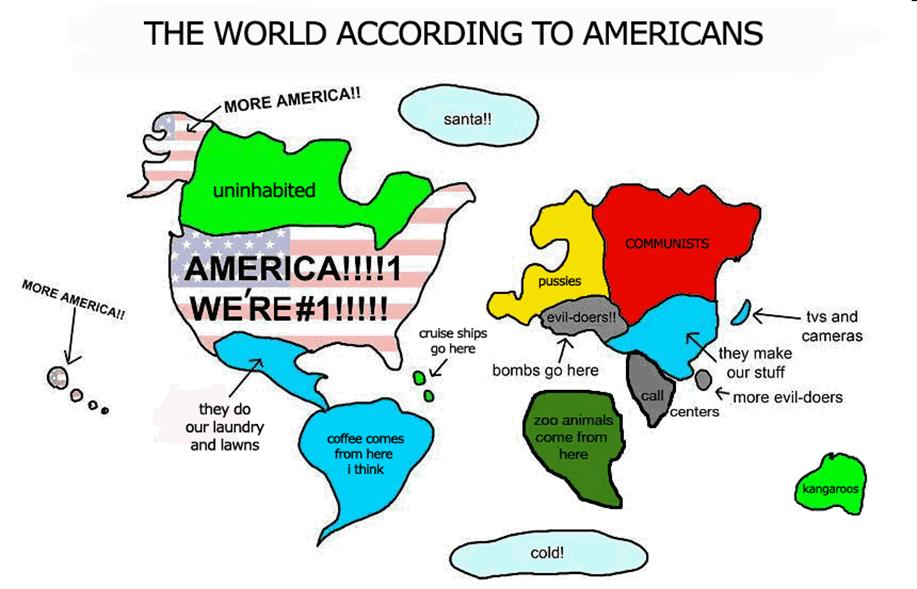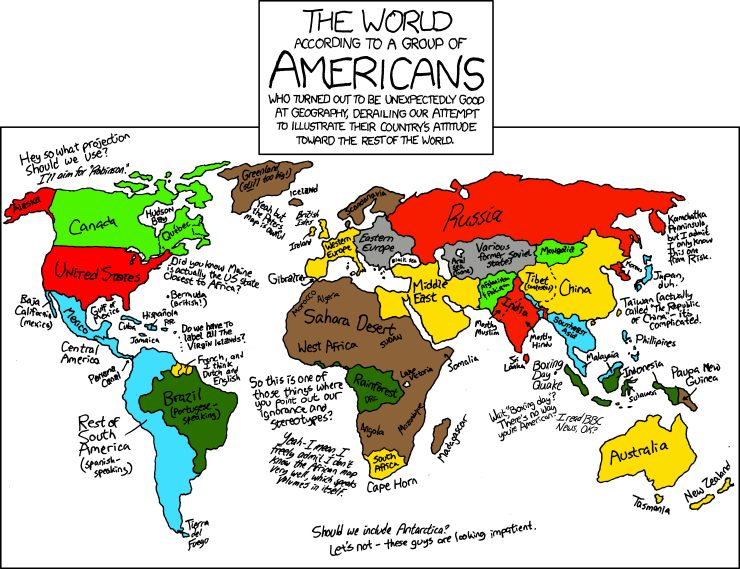It never really comes as a surprise, hearing that Americans have a somewhat egocentric worldview.
This blog post predominantly concerns commonplaces that Americans hold regarding foreign countries, which means I’ll be posting colorful maps like the one shown below:

Maps like these seem to say a lot more than can fit in a blog post about existing stereotypes. But one question to ask is whether or not this is an issue that needs addressing, or whether or not it’s an issue at all. There are a lot of good things about America that we are allowed to be proud of, and most stereotypes hold a bit of truth.
But sometimes the ignorance of “the world according to Americans” is worrying. Here’s another map:
After reading these maps for a while you start to wonder where all these stereotypes come from, and the answer is fairly simple: these are some of the first things we’re taught about foreign countries as children. “People in Africa have AIDS.” “China makes everything.” “Here is a picture of a kangaroo. Where is it from?”
A resounding “Australia.”
So on the other hand,
Most of us know that the world is not made up of countries with one defining characteristic that are years behind us. Iran has McDonald’s, Egypt has Facebook, etc. My own stance is probably more analogous with Randall Munroe’s:

Yes, there are Americans who see the world like the first two maps, but maybe we’re only hearing them because we aren’t even trying to be as loud. We tend to broadcast our beliefs if we fall into the extremes, so you’ll get the diehard nationalists preaching the supremacy of America and you’ll get the disgruntled nonconformists preaching America’s downfall. What you won’t get is the middle of the spectrum, where most of us sit comfortably in our semi-ignorance. And as Munroe points out in his wonderful webcomic xkcd, if we put our heads together we can usually figure out enough about geography.
And we’re not the only ones stereotyping. Foreign countries have certain conceptions of America, similar in their ignorance to the way we see them.

‘MURICA
So do we need to work towards a change in our worldview, or are stereotypes here to stay?

Stereotypes will probably be here for a long time. They will go away when we become integrated as a country. When I say that, I mean that the country will have decent proportions of all cultures so there will be proportional amount of people in multiple occupations and pursuing different interests. When this happens, we will not associate one trait to one group of people. We will have everyone with all types of backgrounds and we will forget about these obsolete stereotypes.
Its sad how true these maps are of many Americans perception of the people in the US. There have been so many times when I’m discussing world issue with people and American Exceptionalism creeps into peoples ideas.
In my opinion, the fact of the matter is exactly how you put it. There are some people out there who are ignorant and fine with living in their tiny bubble, but they don’t make up even a fraction of our country. The stereotypes people hold aren’t likely going anywhere, and they really aren’t even that bad.
Although kind of sad, I feel as though these stereotypes are something that will always be there to stay, but maybe our use of these stereotypes can change. Perhaps even for some, we recognize these stereotypes, but we treat them as a joke. But there are undoubtedly some whose map is not a geographical one, but an egocentric view. How do we change this? Teaching them in a different manner? Maybe the first thing we learn about Australia shouldn’t be that Kangaroos are there and that their accents are awesome?
I typically don’t find these things funny but I’ll admit, this one made me chuckle. They are sooo true though for the most part. It is kinda funny how distorted and ignorant our views can be. I wonder how much truth is behind all of our perceptions of the world now. But I think the funniest commonplaces are the ones the rest of the world has about us. Like a couple of weeks ago I met someone from Scotland, and I asked him what people in Scotland think of Americans, and he said they think we’re fat. But honestly I don’t think that many people are fat. I mean granted a decent amount of our population is obese but like here at PSU I rarely see any big people. Ohhh and you check out the video titled “end of ze world”. It is a really good cartoon about how we all are going to blow eachother up, and it also embodies a lot of the commonplaces that we have about other countries and they have about us.
I think these maps are hilarious. And that’s probably a problem… Maybe I’m the problem?! Well, anyways I think that stereotypes are here to stay. Honestly, we can talk about how much things have changed over the years as to how we view other countries and people, but in the end, things are really all the same
Worldview is just one of many topics that I (and many others, probably) wish the “base” of Americans understood just a little bit better. Public school history class I assume is trying to remedy this problem by offering/requiring courses like “world history” in addition to “American history.” I guess it’s not working because no one is paying attention in class.